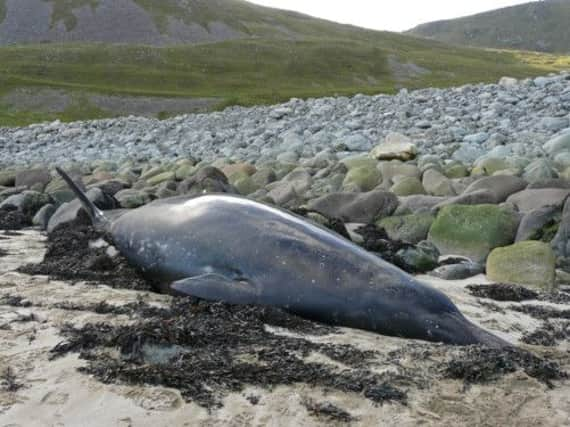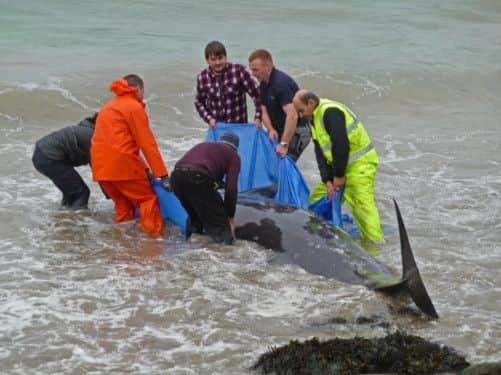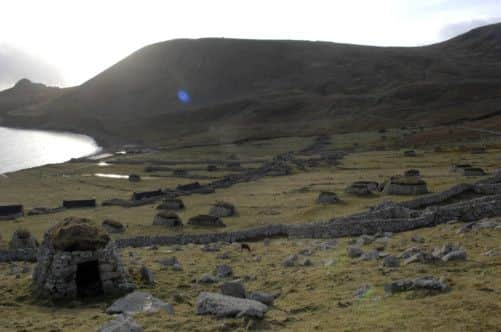Whale dies after becoming stranded on St Kilda


The National Trust for Scotland (NTS) said a rarely-seen Sowerby’s beaked whale and calf became stranded in the shallow waters of Village Bay, on the island of Hirta, 41 miles west of Benbecula last week.
The five metre long adult female and one-and-a-half metre long calf were seen in distress just before 11am on Thursday.
Advertisement
Hide AdAdvertisement
Hide AdStaff from the conservation charity and QinetiQ, the defence technology and security company, immediately attempted to refloat the animals but, despite their quick response and strenuous efforts, were unable to successfully move the mother before it passed away.


The calf freed itself without assistance and was last seen swimming out to open water. It is, however, unlikely to survive without its mother, which was still lactating (producing milk).
A post mortem examination has been carried out on the adult mother.
This event means that there have now been two records of strandings from St Kilda. Elsewhere in the world, deaths of beaked whales have been linked to the use of high energy sonar.
Gina Prior, NTS Seabird and Marine Ranger, said: “The loss of such an enigmatic creature is massively unfortunate, particularly where the calf has been left orphaned, but the post mortem has provided a rare opportunity to learn more about an animal that is difficult to study in the wild.”


Nick Davison said: “There have been 41 records of this species stranding around the Scottish coasts since 1989 nearly all on the West coast and quite a few from the Western isles.
“It is one of the beaked whale family (Ziphiidae) and almost all we know about this species comes from examining stranded animals.
“So it is vitally important to perform post mortem examinations on these animals if at all possible when they strand.
Advertisement
Hide AdAdvertisement
Hide Ad“Not only can we try and establish a cause of death but also gain insights into their life histories. It is not common for this species to strand alive in the UK, the fact that this was a mother and calf pair live-stranding was even more unusual.
“Hopefully tests on the samples taken at the post mortem will shed light on why this animal live stranded.”
There is very little known about the Sowerby’s beaked whale (Mesoplodon bidens). It is small - about five metres long - with males slightly larger than females, they have a rounded forehead, and slender long beak.
Only the adult males have erupted teeth or tusks in this species half way along the lower jaw. The female’s teeth do not erupt.
The species is thought to inhabit the deep offshore water in the North Atlantic ocean. It is shy and rarely seen at sea as it is thought to avoid ships, but there have been around 60 records of strandings around the British Isles in the last 24 years.
Some of these have been from the North Sea, where the whales are believed to have become trapped in shallow water, but the strandings on the west coast have mostly been close to the deep water of the Continental Slope as at St Kilda.
The incident at St Kilda was immediately reported to Nick Davison, Coordinator of the Scottish Marine Animal Stranding Scheme (SMASS) based at the Scotland’s Rural College.
The Scottish Government-funded SMASS collates, investigates and reports information on stranded marine animals for Scotland and is managed by the SRUC Veterinary Investigation Centre in Inverness.
Advertisement
Hide AdAdvertisement
Hide AdNick travelled to the island the following day and was able to perform a post mortem examination.
St Kilda is the UK’s only natural and cultural World Heritage Site and is the remotest outpost of the British Isles lying 41 miles (66 km) west of Benbecula.
Marking the end of thousands of years of human occupation, St Kilda’s remaining population was famously evacuated to the mainland at their own request in 1930.
The archipelago was allocated World Heritage status by UNESCO in 1986 in recognition of its natural heritage, exceptional natural beauty and for the significant natural habitats that it supports. In July 2004 this was extended to include the surrounding marine environment and in 2005, recognition was also given to St Kilda’s unique cultural landscape.